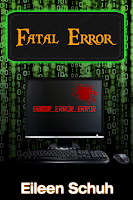No, nothing terrible has happened that might tempt me to utter the dreaded f-word. I was just perusing old files and found an article I'd written about the use of cussing in literature, especially in novels for youth. I wrote it back when I first published THE TRAZ and at the time I deemed the issue quite controversial.
Since then, having fielded no complaints from anyone about the use of f**** in THE TRAZ and FATAL ERROR, I'm wondering if I was all worried and tense about something with which the rest of the world is quite fine.In any event, here's an excerpt from that article, written about a year ago.
Some say swearing in dialogue makes the story
realistic—that that’s how people talk in real life, it’s what kids hear on the
playground, on TV, and in song lyrics'.
Others say that just because people in real life swear—it doesn’t mean it makes good literature. After all, there are lots of things people do in real life (such as bathroom duties) that we don’t especially care to read about.
Others say that just because people in real life swear—it doesn’t mean it makes good literature. After all, there are lots of things people do in real life (such as bathroom duties) that we don’t especially care to read about.
_____________
NEW RELEASE!
FATAL ERROR
Sequel to The Traz
Sequel to The Traz
Crime Fiction/Psychological Thriller
FATAL ERROR on Amazon.com
FATAL ERROR eBook in the UK
_____________
I think both points of view are valid—unless the cussing is
doing something to move the story forward or enrich the drama, the f-word is
not something that looks good on paper.
For some reason, cussing is more stark and dramatic when written than
when spoken. I’d scarcely notice the ‘f-word’ in conversation with someone
prone to use it—but I wouldn’t miss it if written.
One of the discussion questions in the Teaching Guide in the
School Edition of THE TRAZ concerns the use of swearing in the story. Although
I admit I did use the f-word to ensure realism in the dialogue (this novel is
about bikers and drug dealers, who generally don’t say ‘darn it’ or ‘Oh, dear”)
I also used it to define my characters.
As pointed out in the Guide, people swear for several reasons—the most
obvious being because that’s the language they are used to. It’s their culture.
Many people aren’t even aware they are using course language. However, others
swear in an attempt to conceal fear, or to elicit fear, or (especially in the
case of younger people) in an attempt to fit in with a rough group.
When I’ve done readings for youngsters, they giggle and look
down when I read aloud the f-word. I’ve
used that as a teaching tool—pointing out the power of language and the effect
it has on one’s listeners and readers as well as exploring the motives behind
my characters’ swearing.
It is my hope that if my young readers become aware of all
these issues surrounding course language, they’ll be better equipped to both
deal with others’ swearing and to monitor their own.
_________________________________________
THE
TRAZ is available in paperback and ebook formats and in a special School
Edition that includes a Teaching Guide.
Click on the following links to
purchase or sample THE TRAZ
My gift to you (coupon codes valid until 16 December 2012)
$1.00 off regular edition paperback from CreateSpace use coupon code: NB5SUY8H
$1.00 off regular edition paperback from CreateSpace use coupon code: NB5SUY8H
$1.00 off School Edition paperback from CreateSpace. Use coupon code until 16th Dec
Also available:
And from other fine online bookstores.
If THE TRAZ is not on your local bookstore or library
shelves, ask for it to be ordered in for you.
Visit my Facebook
Fan Appreciation Page
Follow me on Twitter
Follow Katrina on Twitter: KatrinaBuckhold
I'm also the author of SCHRÖDINGER’S
CAT a SciFi novella
Eileen Schuh
www.eileenschuh.com





